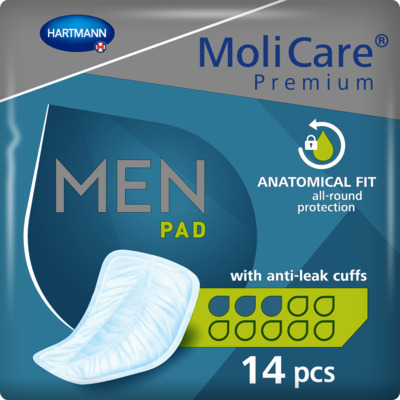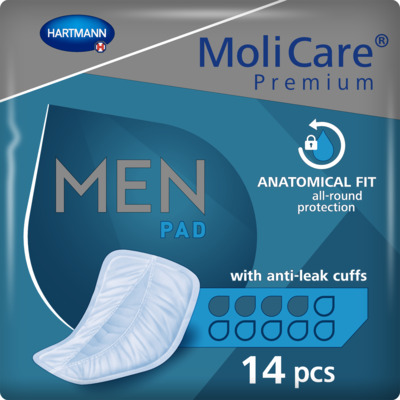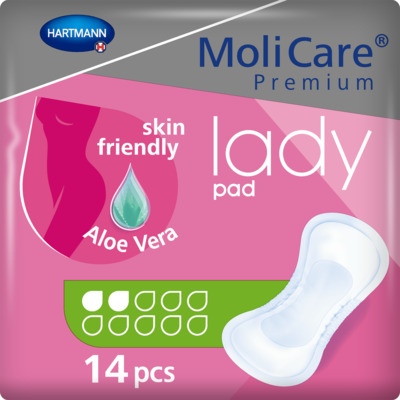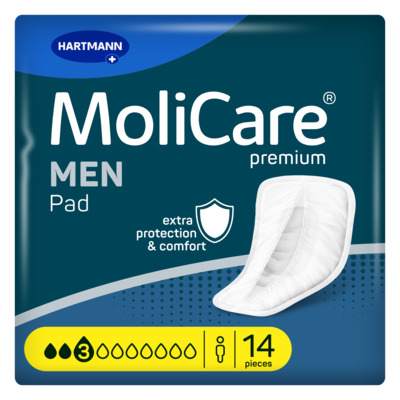Active living
Being A Carer For A Family Member
Being a carer for a family member is becoming common. With developments in medicine enabling people to live longer, there are now around 6.5 million people providing care around the UK.Although caring for loved ones can be very fulfilling, it can also be difficult at times, and being prepared for anything the role can bring will help you cope for every eventuality. Whether you’ve just started caring for a loved one or you’ve been doing so for a while, we have collated information and resources that you may find useful.

How To Be a Carer for A Family Member
Although there’s no distinct guide to being a carer for a family member, there are several things you can do to make the role easier. Incontinence is common in older adults and MoliCare® are here to help you with a range of bathing, cleansing and bladder leakage products to help you care for your loved ones.
MoliCare® recommendations:
1. Bathing without a bath or shower - MoliCare® Wash Gloves and Shampoo Cap
2. Cleansing intimate areas - MoliCare® Moist Tissues
3. Caring for intimate skin - MoliCare® Skin Barrier Cream
4. Bladder leakage and able to use the toilet independently - MoliCare® Premium Mobile disposable incontinence pants
5. Incontinence and unable to self toilet - MoliCare® Premium Elastic disposable adult nappies
- Research Your Loved One’s Condition – Understanding as much as you can about the illness or disability of the person you are caring for will help you look after them more effectively
- Register As a Carer with Your GP – You may be entitled to additional health services as a carer. This includes support with physical health issues caused by caring, reminders to book in for a flu jab every year, flexible appointments that work around your care schedule and mental health support
- Talk To Other Caregivers – Being able to talk to others who understand your situation can help you to look after your own wellbeing
- Encourage Independence – Being a carer for a family member doesn’t mean you have to do everything for them. Encourage strategies and technologies that let your family member to remain as independent as possible
- Connect With The Person You Care For – taking the time each day to talk and connect with the person you are caring for can help both parties
- Inform Your Employer of Your Caring Responsibilities – Caregiving may affect your work life, so letting your employer know the responsibilities you’ve taken on can enable them to help you deal with any increased stress
- Take Care of Your Own Needs – Exhaustion, burn out, and distraction can make it difficult to connect with the person you are caring for and negatively affect your mental health. Attending to your own needs outside of caregiving will help you balance your life and de-stress
- Know Your Limits – Knowing your limitations will give you a healthy balance between caregiving and relaxing. Communicate your limits to all involved in caring, including doctors and family members, to set clear boundaries
Being a carer for a family member
Who Is Considered a Carer?
Unfortunately, many carers don’t understand that they have taken on the role. On average, it takes them two years to acknowledge their role as a carer1. This is because the lines between taking on a caring role and the natural development of the relationship are often blurred.
According to the NHS, a carer is anyone who looks after a family member, partner or friend who isn’t able to do so themselves due to an illness, disability, infirmity, mental health issue or addiction2. The person is unable to manage everyday tasks without the support of their carer. A carer can be anyone, including children or adults, who takes on these responsibilities. However, you cannot be considered a carer if the care you provide is through voluntary work or part of a contract of employment.
What Does a Carer Do?
There are many different responsibilities that unpaid carers take on when caring for someone else. Depending on the nature of the situation, these could take up some or all of your time. For example, it’s necessary for some carers to move in with their loved one to provide constant support, whereas other carers may only visit once a day. The amount of care provided depends upon the condition of your loved one, but being a carer for a family member may entail assisting with:
- Maintaining hygiene (Read more about how to maintain good hygiene for someone you care for)
- Mobility support
- Physical support
- Ordering medical supplies
- Arranging hospital appointments
- Household chores
- Shopping
- Meal preparation
- Managing the household budget
- Social interaction
- Emotional support
- Ensuring the rights of the person you care for are being met3
You may also be caring for someone who has challenges taking care of their own personal cleansing and hygiene, or have bladder weakness or incontinence as a result of mental of physical impairment. We recommend incontinence pants for adults who can get to the toilet themselves usually, but might need some protection in case of an accident. While MoliCare® adult nappies provides a solution for someone who can't self toilet during the day and night time with a range of sizes and absorbencies that can also help with maintaining their dignity should a bladder leakage occur.
How To Look After Yourself While Caring for A Family Member
Although naturally, your focus is on the well-being of the loved one you are caring for, it’s important to consider your own health too. Being a carer for a family member can be tough, but seeking extra support will help both you and them in the long run. There are several aids and benefits that you are eligible for as a carer, and the extra support could make a huge difference.
The Benefits of Caring for A Family Member
Being a carer for a family member may be a difficult job at times, but it can bring you and your loved one together in ways others wouldn’t understand. Also, the role of a caregiver will encourage direct conversations that bond you together, helping you focus on what’s really important to you. So, enjoy this incredible role as much as you can, but don’t be afraid to ask for help to protect both you and your loved one.
Sources
- https://www.progresslifeline.org.uk/news/carers-week-2021
- https://www.england.nhs.uk/commissioning/comm-carers/carers/
- https://www.mygov.scot/becoming-a-carer
- https://www.gov.uk/carers-allowance
- https://www.gov.uk/carers-credit
- https://www.mariecurie.org.uk/help/support/benefits-entitlements/carers/premium
- https://www.nhs.uk/conditions/social-care-and-support-guide/support-and-benefits-for-carers/carer-breaks-and-respite-care/
- https://ukcareguide.co.uk/respite-care/

MoliCare® Premium Men Pad 3 Drops
<h2>Suitable for men with bladder weakness</h2> <p>Suitable for men of all age groups, body shapes and sizes, it truly is a one size fits all with this range. It is never pleasant to go about daily activities with the potential risk of an incontinence slip, MoliCare® have created the Premium Men Pad 3 drops, designed with a V-Shape to comfortably fit around the desired area, and has a textile-like back sheet for extra protection.</p> <p>To make sure that you choose a premium men pad that is right for you, check out the additional features of this product range:</p> <h2>Leakage protection for men you can rely on</h2> <p>With a body-shaped design, these absorbent mens pads offer reliable protection for men with light bladder weakness. The soft, cotton-like materials ensure discreet comfort, and the odour neutraliser keeps you feeling fresh and confident.</p> <h2>Secure fit and skin-friendly</h2> <p>The Premium MEN Pads feature a wide adhesive strip for secure fixation in your regular underwear, providing you with peace of mind during your daily activities. The soft and breathable materials are gentle on your skin, maintaining its health with a skin-friendly pH.</p> <h2>All-round protection for men</h2> <p>MoliCare® Premium MEN Pads are equipped with a quick dry system, anti-leakage system, and cuffs for added security, ensuring all-round protection you can trust. Dermatologically tested, these pads are safe and reliable for daily use.</p> <h2>Tailored for your needs</h2> <p>Available in different absorbency levels, MoliCare® incontinence products for men cater to varying degrees of incontinence, providing you with the level of care that suits your needs. MoliCare® Premium MEN Pads are perfect for daily wear or when you need extra protection against slight to moderate incontinence. Discreet and comfortable, they enable you to maintain your active lifestyle with confidence.</p> <h2>Fast and reliable delivery</h2> <p>Our quick ordering service makes it easy to get the incontinence products you need. Additionally, our price match promise ensures you get both quality and value for money.</p> <p>Enjoy fast delivery on all orders over £50 when you purchase from HARTMANN Direct.</p>
MoliCare® Premium Men Pad 4 Drops
<h2>Comfortable and absorbent</h2> <p>Why MoliCare for men? Hers are some of the key features of the MoliCare® Premium Men Pads from Hartmann:</p> <ul> <li>Discreet and comfortable</li> <li>Fits the male physique</li> <li>3-layer absorbent core</li> <li>Fast-absorbing system</li> <li>Anti-leakage cuffs</li> <li>Odour neutralisers</li> <li>Wide adhesive strip</li> <li>Skin-friendly</li> </ul> <p>With an affordable price and great quality guarantee, you cannot regret choosing MoliCare® Premium Men Pad 4 drops, equipped with anti-leak cuffs, and 14 pieces per bag.</p> <h2>Slim and discreet under clothing</h2> <p>MoliCare® Premium MEN Pads offer reliable support for men dealing with bladder weakness. Whether it's stress incontinence or urge incontinence, these pads for men are designed to provide a discreet and quick solution on the go. Simply place the pad before applying your underwear and secure it with the adhesive strip for worry-free protection. MoliCare® Premium MEN Pads offer full coverage for men facing very light to moderate bladder weakness.</p> <h2>Leakage protection for men</h2> <p>MoliCare® understands that each individual's incontinence needs are unique. That's why our incontinence products, including MoliCare® Premium MEN Pads, are available in different absorbency levels. You can find the perfect fit and protection for your specific requirements.</p> <h2>Reliable and soft on the skin</h2> <p>Our body-shaped absorbent pads are designed to deliver dependable and skin-friendly incontinence protection every day. Experience discreet comfort with the soft, cotton-like materials and the added benefit of an odour neutraliser, ensuring you feel fresh and confident throughout the day.</p> <h2>Fast delivery to your home</h2> <p>At HARTMANN Direct, we ensure a fast delivery service for all our products. Enjoy free delivery on orders over £50, making it convenient and hassle-free to receive the incontinence products you need. Our dedicated customer care team is here to discuss your incontinence product needs and answer any questions you may have. Call us today on 0800 028 9470 to experience the comfort and confidence that MoliCare® Premium MEN Pads can provide.</p>
MoliCare® Premium Lady Pad 2 Drops
<h2>Skin Friendly Pant Liners</h2> <p>For women that experience slight incontinence and bladder weakness, across different age groups, it can be a challenge to find the right bladder weakness product that is easy to apply and wear without the worry of potential leakages. Fortunately, we understand this approach, hence why we are happy to offer our MoliCare® Premium Lady Pad 2 drops, that is skin-friendly, Aloe Vera applied, and comes with 14 liners per bag.</p> <h2>Slim and discreet liners</h2> <p>Whether dealing with stress incontinence or urge incontinence, these panty liners offer a discreet and easy solution on the go. Simply place the pad in your underwear and secure it with the adhesive strip for all-round protection. Available in different absorbency levels, MoliCare® bladder weakness products cater to all levels of bladder weakness, ensuring secure care.</p> <h2>Control Bladder Weakness</h2> <p>Enjoy the benefits of these body-shaped absorbent panty liners, designed for women with bladder weakness. The pads offer discreet, reliable protection with features including odour control and fast absorption.</p> <p>With a wide adhesive strip, you can comfortably fix the pad in your regular underwear, providing secure and comfortable fixation. The pads are skin-friendly, featuring soft, breathable materials, including foam cuffs, and a top sheet treated with Aloe Vera.</p> <p>Keeping your skin healthy is a priority, which is why MoliCare® Premium Lady Pads have a skin-neutral pH value of 5.5 and an antibacterial finish. They are also dermatologically tested, offering peace of mind.</p> <h2>Buy pant liners online</h2> <p>Never worry about running out with our convenient order service and fast delivery direct to your door. Enjoy free shipping on orders over £50.</p> <p>If you need assistance, our professional customer service team is here to support you in choosing the right product. Reach out to us today at 0800 028 9470 and experience the comfort and reliability of MoliCare® Premium Lady Pads.</p>





